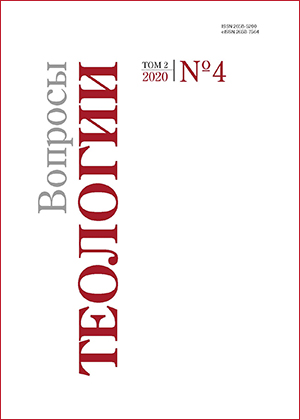Why does the church need religious studies?
DOI:
https://doi.org/10.21638/spbu28.2020.404Abstract
The article, addressed to those involved with church education and science, as well as participants of the religious studies scientific community, offers a set of arguments in favor of the development of academic religious studies as an educational and research practice in higher educational institutions of the Church. The author describes his vision of the problematic situation in the field of scientific disciplines that study religion and indicates the traditional nature of the Church’s appeal to secular humanitarian knowledge. From the point of view of the categories of the ‘existing — ought’ and ‘general — individual,’ the mutual relationship of theology and religious studies as related disciplines is clarified. The author identifies a set of subject areas, specific goals and tasks, of research in the field of religious studies, which are significant for the Church and their potential customers-consumers in the Church. The forms of its interdisciplinary interaction with theological knowledge are discussed. According to the author, religious studies, on the one hand, have their own value, and, on the other hand, they can result in concrete benefits in the analysis of problematic situations that need effective resolution. In this perspective, the subject matter of religious studies is structured in the form of a system of concentric circles: Holiness, manifested in people and artefacts, Church hierarchy (bishops, priests, monks), Church laity, Orthodox by self-determination, traditional religions, non-conventional religiosity, history and the current state of religion in general. In conclusion, the main functions of religious studies knowledge within the framework of Church life are highlighted: research, education, expert consulting, missionary and apologetic. The general characteristic features of this knowledge is proposed. The question is raised about the relationship between the academic and ecclesiastical aspects in the process of obtaining it in the perspective of its validity. The author criticizes the popular idea of “Orthodox religious studies”, discusses various forms of interaction between Church and secular scholars, opportunities for non-authoritarian forms of interaction between the Church hierarchy and the hierarchy within the Church’s scientific community, and justifies the need to increase the number of research and educational religious institutions (departments, research centers) in the Church.
Keywords:
religious studies, theology, Church, sanctity, sociology of religion, psychology of religion, history of religion, academicism
Downloads
References
References
Downloads
Published
Issue
Section
License
Articles of "Issues of Theology" are open access distributed under the terms of the License Agreement with Saint Petersburg State University, which permits to the authors unrestricted distribution and self-archiving free of charge.




